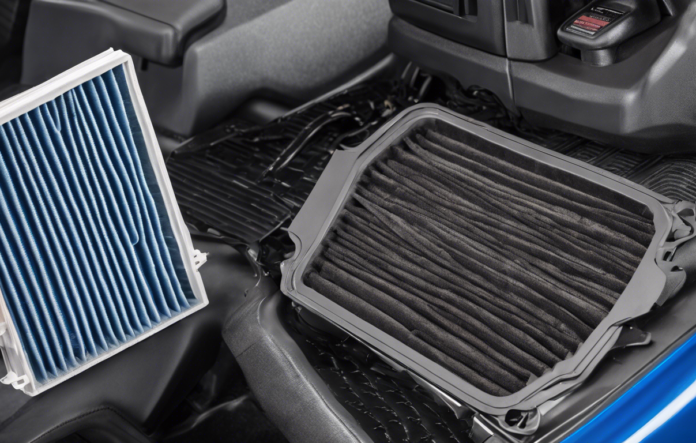Your car’s performance relies on many factors, including the cabin air filter. This small but very important component performs a significant task of maintaining your vehicle’s efficiency and health.
A cabin air filter ensures that only clean, fresh air enters your car’s interior, protecting you from harmful pollutants and allergens. Upgrading to a performance car cabin air filter not only enhances the air quality but also contributes to the overall functionality of the HVAC (heating, ventilation, and air conditioning) system, ensuring that airflow remains optimal and consistent.
Benefits of Performance Cabin Air Filters
Improved Air Quality and Health Benefits
Upgrading to a performance cabin air filter means reducing the amount of sneeze-inducing allergens and lung-clogging pollutants that can hitch a ride into your car. Breathe easier knowing that your filter is working rigidly to keep those irritating particles at bay.
Cleaner air means healthier lungs for you and your passengers. With a performance cabin air filter on duty, you can enjoy reduced exposure to harmful contaminants, leading to significantly reduced respiratory issues and a more pleasant driving experience.
“An ideal atmosphere, without exhaust gases, bacteria, dust, pollen and other contaminants, cabin filters ensure a healthy and hygienic atmosphere in the vehicle and thus enhance drivers’ ability to concentrate,” affirms Anna Hülsmann, Marketing Consultant at Hengst SE.
Another notable advantage of a high performance car cabin air filter is its ability to act as a barrier against odors. Effective filters can trap and neutralize odors including traffic pollution, exhaust fumes, and even smoke smells. Activated charcoal or carbon cabin air filters are specifically designed to target and reduce various odors, ensuring that the air inside the vehicle remains fresh.
“The level of exposure to the vehicle’s occupants can be up to five times higher than that of passersby on the roadside. In one hour, the ventilation system in a car draws 300,000 liters of air into the interior of the vehicle – together with pollutants, allergens and odors from the immediate environment. Fortunately, cabin air filters substantially reduce the pollution level even in the case of very fine particles (PM1 and smaller), therefore contributing to a healthy and hygienic climate in the vehicle,” says Hülsmann.
Regular replacement of these filters is essential not only to prevent the infiltration of unpleasant odors but also to avoid the growth of mold, which can cause musty smells and contribute to health issues if inhaled. Maintaining clean air helps to keep the driver stay alert and focused during long drives, enabling quicker and more effective responses to potential hazards on the road.
Enhanced HVAC System Efficiency
Performance cabin air filter helps keeping dust and debris out of your HVAC system making sure that the air flows freely and your cooling system works efficiently. Over time, a clogged filter can lead to reduced airflow, forcing the HVAC system to work harder, which can shorten the life of its components. With a performance filter in place, your HVAC system doesn’t have to work as hard to push air through all that gunk. This reduced strain can lead to improved longevity for your system, fewer breakdowns, and potentially lower repair costs down the road.
Cost Savings and Environmental Impact
While the initial cost may be slightly higher than standard filters, the improved durability and efficiency of performance filters can save money over time by lasting longer and requiring less frequent replacements. This reduces the number of filter replacements; thus less waste is generated. Innovative filtration technologies, can effectively remove up to 98% of nitrogen dioxide (NO2) from polluted air flows. This reduction is crucial, as NO2, along with particulate matter, contributes significantly to environmental pollution, which can lead to severe health issues.
“Cabin filters filter approximately 100 percent of pollen, dust, bacteria, viruses, other allergens, and odors such as exhaust gases out of the air. This ensures a hygienic atmosphere in the vehicle and helps the driver remain alert and with full concentration,” asserts Hülsmann.
Maintaining and Prolonging the Lifespan of a Performance Air Filter
To ensure your performance air filter keeps doing its job effectively, regular maintenance is key. One simple tip is to check and replace the air filter according to the manufacturer’s recommendations. Dusty roads or heavy traffic can clog up the filter faster than usual, so keeping an eye on it is important.
“Regularly changing the cabin filter is necessary to ensure permanent functionality of the air conditioning system. The rule of thumb is at least once a year, and many drivers change them twice a year. This not only protects the air quality in the vehicle, but also reduces flow resistance and thus the load on the fan motor,” recommends Hülsmann.
Another way to extend your filter’s lifespan is to inspect for any tears or damage in the filter material. A damaged filter won’t be as efficient in trapping harmful contaminants, impacting both your car’s performance and your health. Regular filter changes also ensure compliance with HVAC equipment warranties, which may require specific maintenance routines to remain valid.
Take charge of the air you breathe while driving and elevate your driving experience with a performance car cabin air filter. Choose excellence for both yourself and your vehicle by upgrading to a performance cabin air filter today!




